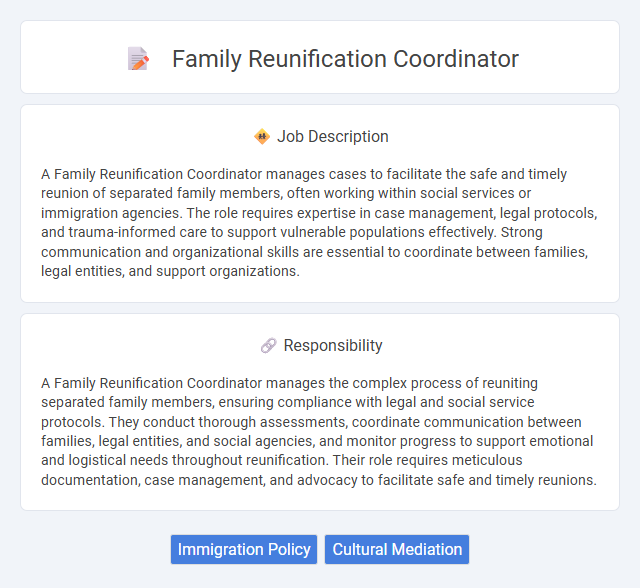
A Family Reunification Coordinator manages cases to facilitate the safe and timely reunion of separated family members, often working within social services or immigration agencies. The role requires expertise in case management, legal protocols, and trauma-informed care to support vulnerable populations effectively. Strong communication and organizational skills are essential to coordinate between families, legal entities, and support organizations.
Individuals with strong empathy and excellent organizational skills are likely suitable for a Family Reunification Coordinator role, as the job often involves working with vulnerable families experiencing distress or crisis. Those who can maintain patience and communicate effectively under stressful conditions may have a higher probability of success in facilitating reunification processes. Conversely, candidates lacking emotional resilience or attention to detail might find the demands of this position challenging.
Qualification
A Family Reunification Coordinator typically requires a bachelor's degree in social work, psychology, or a related field, often complemented by specialized training in family therapy or child welfare. Strong skills in case management, conflict resolution, and cultural competency are essential to facilitate effective communication between separated family members. Professional experience in social services, particularly working with vulnerable populations, enhances the ability to navigate complex legal and social systems involved in family reunification processes.
Responsibility
A Family Reunification Coordinator manages the complex process of reuniting separated family members, ensuring compliance with legal and social service protocols. They conduct thorough assessments, coordinate communication between families, legal entities, and social agencies, and monitor progress to support emotional and logistical needs throughout reunification. Their role requires meticulous documentation, case management, and advocacy to facilitate safe and timely reunions.
Benefit
A Family Reunification Coordinator likely improves the emotional well-being of families by facilitating smoother reunification processes. They probably enhance communication between family members and relevant agencies, increasing the chances of successful outcomes. This role may reduce stress and uncertainty for families, contributing to stronger family bonds and stability.
Challenge
The role of a Family Reunification Coordinator likely involves navigating complex emotional and legal challenges to successfully bring separated family members together. Coordinators probably manage sensitive cases requiring conflict resolution, cultural understanding, and effective communication under stressful conditions. Balancing the expectations of families with legal constraints may present ongoing difficulties, emphasizing the need for resilience and problem-solving skills.
Career Advancement
A Family Reunification Coordinator plays a critical role in facilitating the smooth reintegration of separated family members by managing case progress and liaising with social services and legal agencies. Career advancement in this field often leads to senior roles such as Program Manager or Director of Social Services, where professionals oversee broader community initiatives and policy development. Gaining expertise in trauma-informed care, legal frameworks, and multicultural communication significantly enhances promotion opportunities within social work and humanitarian organizations.
Key Terms
Immigration Policy
A Family Reunification Coordinator specializing in Immigration Policy facilitates the legal process for families separated by immigration barriers, ensuring compliance with national and international regulations such as the U.S. Immigration and Nationality Act and the United Nations Convention on the Rights of the Child. This role demands expertise in visa petition procedures, family-based immigration applications, and understanding of policy changes impacting reunification eligibility and timelines. Effective coordination with government agencies, legal entities, and advocacy groups is critical to streamline case management and support immigrant families in navigating complex immigration systems.
Cultural Mediation
A Family Reunification Coordinator specializing in Cultural Mediation facilitates communication and understanding between families from diverse cultural backgrounds and relevant social services, ensuring a smooth and respectful reunification process. They apply deep knowledge of cultural norms, language nuances, and community values to mediate conflicts and foster trust. Expertise in cross-cultural communication and conflict resolution is essential for promoting family cohesion and supporting social integration during reunification.
 kuljobs.com
kuljobs.com